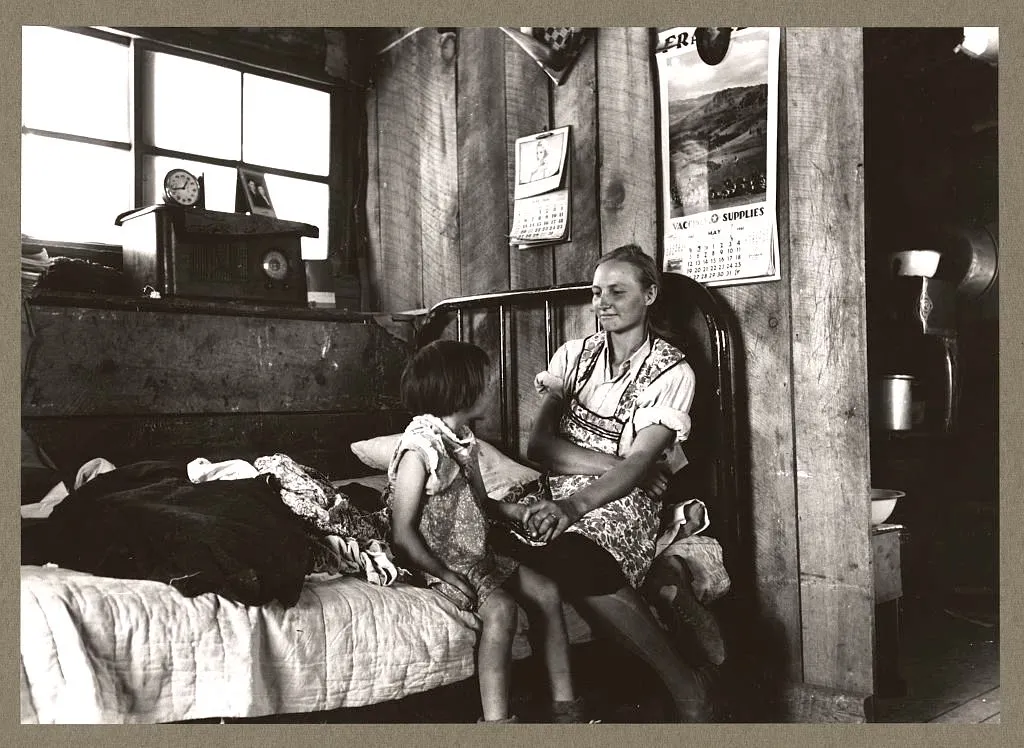Radio days

I love this picture from Russell Lee’s famous series of photos of Depression-era Americans, created for FDR’s Farm Security Administration. This one shows Mrs. Caudill and her daughter, of Pie Town, New Mexico, listening to news on their radio in the summer of 1940.
I’m fascinated by how FSA-sponsored photographers like Lee, Walker Evans, Dorothea Lange, Russell Lee, Arthur Rothstein, Marion Post Wolcott, Gordon Parks and others harnessed the evocative power of photography. The fact that they had to work in monochrome seems to me to give their work much more impact. This is particularly interesting for me because, having worked in colour for three decades or more, I’m now trying to re-learn how to use B&W myself, including the obvious lesson that it’s a completely different medium, and you can’t get at it by shooting in colour and then siphoning off the colour in post-production manipulation. You have to think in B&W before you press the button. And things that work in colour don’t work in monochrome. Horses for courses, etc. Sigh.
Quote of the Day
“The years between fifty and seventy are the hardest. You are always being asked to do things and yet you are not decrepit enough to turn them down.”
- T.S. Eliot
Musical alternative to the morning’s radio news
Liam O’Flynn, Seán Keane, Paddy Glackin, Arty McGlynn & Paul Brady | Gradam Ceoil TG4 2007
A real line-up of Maestros. Three reels — The Humours of Carraigholt, Major Harrison’s Fedora and Tommy People’s Reel (my favourite). And note the seamless switches between each (at 1:13) and 2:26)
Long Read of the Day
Generative AI and intellectual property
Typically laconic and thoughtful essay by Benedict Evans asking If you put all the world’s knowledge into an AI model and use it to make something new, who owns that and who gets paid?
This is, he slyly observes, “a completely new problem that we’ve been arguing about for 500 years”.
We’ve been talking about intellectual property in one way or another for at least the last five hundred years, and each new wave of technology or creativity leads to new kinds of arguments. We invented performance rights for composers and we decided that photography – ‘mechanical reproduction’ – could be protected as art, and in the 20th century we had to decide what to think about everything from recorded music to VHS to sampling. Generative AI poses some of those questions in new ways (or even in old ways), but it also poses some new kinds of puzzles – always the best kind.
At the simplest level, we will very soon have smartphone apps that let you say “play me this song, but in Taylor Swift’s voice”. That’s a new possibility, but we understand the intellectual property ideas pretty well – there’ll be a lot of shouting over who gets paid what, but we know what we think the moral rights are. Record companies are already having conversations with Google about this.
But what happens if I say “make me a song in the style of Taylor Swift” or, even more puzzling, “make me a song in the style of the top pop hits of the last decade”?
Evans has an admirably ‘light’ style and a neat way of posing complex problems in thought-provoking ways. He also loves paradoxes, but then, so do lots of good writers.
Worth a read.
My commonplace booklet
Biodiversity Flourishes in Historic Lawn Turned Wildflower Meadow
A nice story from Scientific American about an experiment conducted by the Head Gardener of King’s College, Cambridge.
Thanks to David Ballard for spotting it..
Linkblog
Some things I noticed, while trying to drink from the Internet firehose.
-
DeepMind made a watermark for AI images that you can’t edit out Link. It seems to be a clever use of steganography. Might help with protecting artists’ IP.
-
‘Life or Death:’ AI-Generated Mushroom Foraging Books Are All Over Amazon Link. Perfectly predictable. And perfectly pernicious.
This Blog is also available as an email three days a week. If you think that might suit you better, why not subscribe? One email on Mondays, Wednesdays and Fridays delivered to your inbox at 6am UK time. It’s free, and you can always unsubscribe if you conclude your inbox is full enough already!
